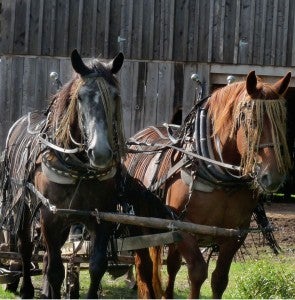Draft Animals on the Farm – Beginning Farmer Training
More small farms are using draft animals to replace fuel-burning tractors - Groundswell Center (Ithaca, NY) to offer hands on training this fall.
As a new generation of farmers looks towards a fossil fuel-free future, a growing number of beginning farmers are using horses, mules, and even oxen to power their small farms. The Groundswell Center for Local Food & Farming, based in Ithaca, NY, is supporting this trend by providing hands-on training for beginning and aspiring farmers. Three of Groundswell’s primary Mentor Farms use draft animals to partially or fully replace tractors for plowing, cultivating, and cutting hay.
Dedicated teamsters like Donn Hewes are passionate about passing on the almost-lost art of training and driving draft animals. Hewes works with both horses and mules at his farm, Northland Sheep Dairy, in Marathon, NY. Hewes has taught a draft animal practicum for several years for Groundswell’s beginning farmer trainees. “Donn’s draft horse class is one of our most popular,” says Joanna Green, Director of Groundswell. “He really loves teaching people how to think like a horse!”
Genevieve DeClerck is an aspiring farmer who took the class in 2011. She says, “The draft horse workshop at Northland was incredible. Literally one of the coolest things I’ve ever participated in EVER. Donn is a Master and is so generous with his time and knowledge.”
Groundswell Draft Animal Practicum: Introduction to Working with Draft Animals Saturday & Sunday, Sept 20-21, 2014, 9 AM – 3PM
Instructor: Donn Hewes – Location: Northland Sheep Dairy, Marathon, NY – Tuition: Sliding scale, $125 to $290 for two days
To register send email to info@groundswellcenter.org or call 607-319-5095
What participants will learn: Why farm with horses and mules?; How horses relate to horses; how we can use that to provide leadership; Working safely with horses; Using lines to drive horses; Harnessing horses and mules for work; Hooking to equipment; Using one or two draft animals to move logs; Driving a wheeled vehicle; Economics of farming









 Your Privacy Choices
Your Privacy Choices
Leave a comment